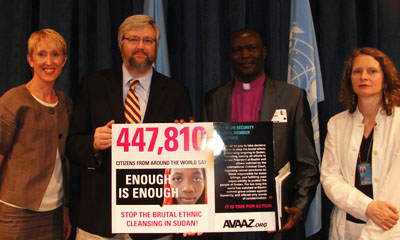As the Sudanese government continues to systematically target and attack civilians in the Nuba Mountains of Sudan’s South Kordofan region, the retired Rev. Andudu Adam Elnail who serves as the Anglican bishop of Kadugli, has become a voice of urgency for the region and its people.
On Friday, a day after testifying before an emergency U.S. Congressional hearing, Bishop Andudu gave a press conference at the U.N., organized by Avaaz, Human Rights Watch, and Sudan Now. He spoke about ethnic violence taking place since early June in the Nuba Mountains, the current situation on the ground, and what actions the international community needs to take to protect civilians and restore peace in South Kordofan.

The bishop presented an Avaaz petition to the Security Council with nearly half a million signatures, calling for Security Council members to take urgent action to halt ongoing human rights violations in South Kordofan and other parts of Sudan.
Bishop Andudu left the region in early May, but remains in regular contact with parishioners on the ground who inform him of new bombings and attacks. “There is a lot of killing going on and we consider this as ethnic-cleansing,” he said during the press conference. “So that is why we are calling on the U.N. and the U.N. Security Council to consider what is going on in Sudan.”
Recent reports have found evidence of mass graves and systematic killing in Kadugli, the capital of South Kordofan. This evidence corroborates on-the-ground allegations of a mass killing campaign by the Sudan Armed Forces against the Nuba people “This is a state-sponsored ethnic cleansing campaign where the government of Sudan is killing its own people through a campaign of artillery shelling, aerial bombardment, and house-to-house killings,” Enough’s Jonathan Hutson told VOA.
Gedila Musa, a Nuban living in the United States who was visiting Kadugli when violence broke out in June, joined the bishop at the press conference. Her testimony featured in a piece by Religion Dispatches on the bishop’s visit:
People have to be very careful when walking. They have to remain very low and hide in order to avoid being targeted by airplanes. People are very tired, the mountains are very big and it is tiring to walk. I personally was very very exhausted. The elderly and kids who are sick or injured have nobody to turn to, there are no doctors.
Currently, the United Nations Mission in Sudan, or UNMIS, is preparing to leave Sudan. However, Bishop Andudu asked the Security Council to allow U.N. peacekeepers to remain in South Kordofan. “We need the presence of [the] U.N. in Sudan to monitor the situation so that the cease-fire can be made, and we have access to another negotiation which can bring peace and bring us freedom to the people of Nuba,” he said.
Another concern Bishop Andudu addressed during the press conference was the lack of food in the region. Due to aerial bombings, people of the Nuba Mountains have been displaced and fields have been destroyed. To avoid famine in the coming months, he called on the U.N. to pressure the Sudanese government to allow humanitarian organizations and food aid into the region.
While at the U.N., the bishop also met with delegations from the U.K., Germany, Lebanon, and South Africa to press his case for immediate action in South Kordofan.
This plea for U.N. action was echoed outside the doors of the U.N. following the press conference on Friday. People of the Nuba Mountains, as well as other Sudanese diaspora members and supporters, rallied outside the U.N. headquarters, captured in this video by BBC, to remind the world about the violence taking place, and to call on the U.N. to protect their fellow Nuba people.
The Security Council is expected to discuss Sudan on Thursday and could receive a briefing on the situation in South Kordofan at that time, according to VOA.

